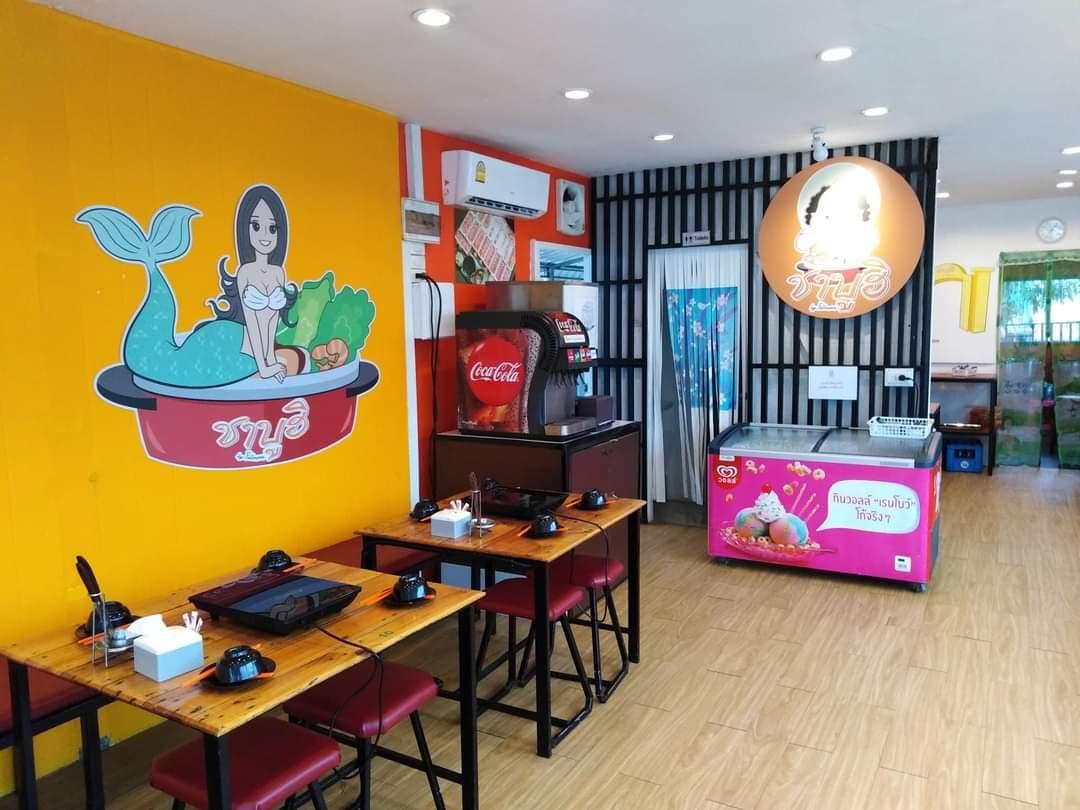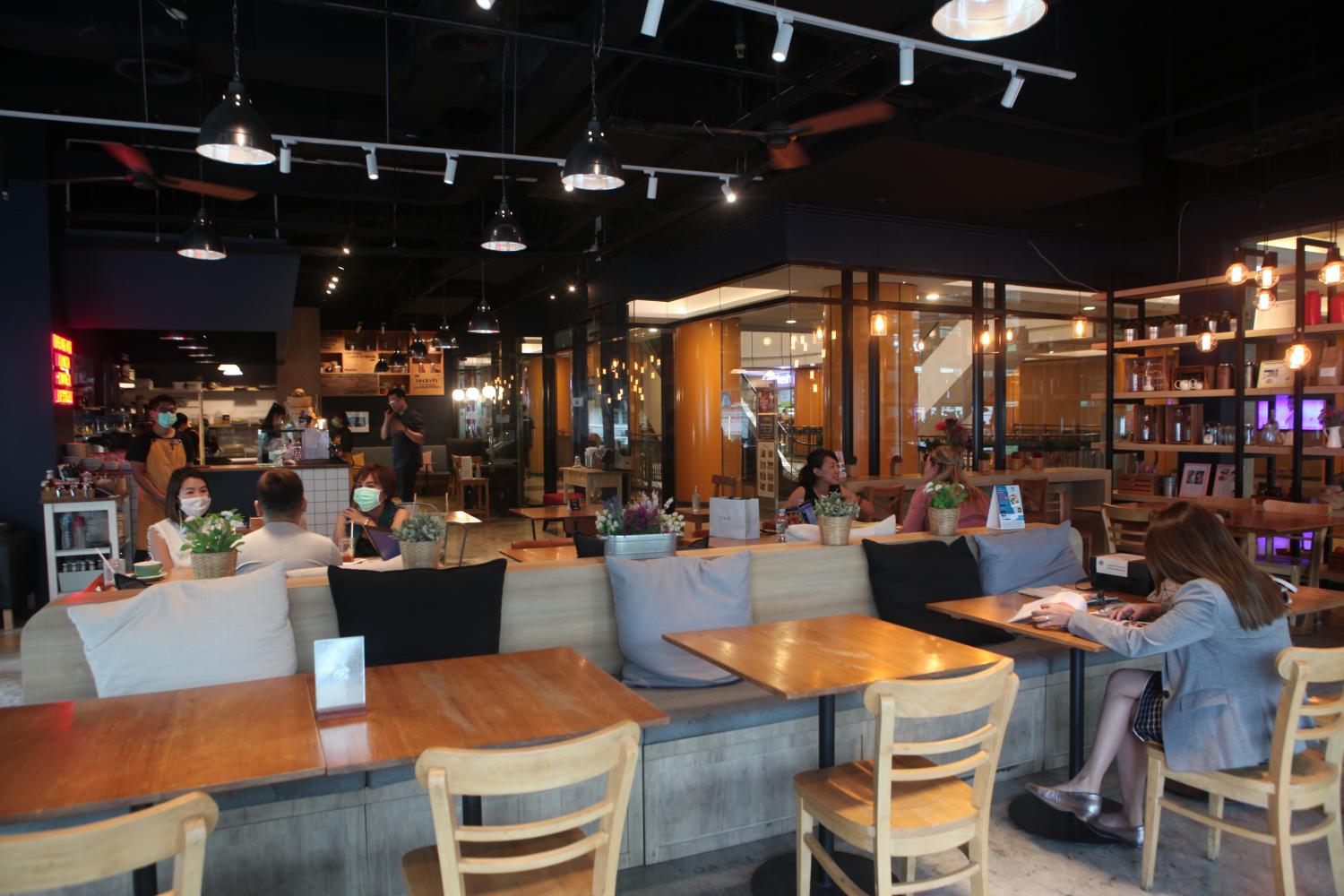For a month, the new wave of Covid-19 has disrupted Thailand's economic recovery and people's lives. Authorities ordered some businesses and entertainment venues in high-risk areas to close temporarily, resulting in some entrepreneurs and workers losing income or jobs.
While the number of Covid-19 cases is skyrocketing and no one knows when the crisis will end, Life talks to people from various industries about their experience.
Restaurant
Living in Rayong, one of the clusters of the re-emerging Covid-19 outbreak, Thana Settaparnich has run the Shabu Hi eatery for five years but is now shifting his business to an online platform.
Standing close to Ban Phe Pier, his shop offers a shabu buffet line for 199 baht, making it popular with local diners and families. Following disease control measures that force restaurants inside the red zone to stop table service by 9pm, he decided to close his shabu shop and create a new menu for delivery instead to avoid large gatherings and the chance to spread the virus.

Chirayu Na Ranong, owner and chef of Chu. (Photo: Somchai Poomlard)
"My air-conditioned shop offers a shabu buffet line, where customers serve themselves. We're in the high-risk area, but authorities didn't clarify what we should do. I'm confused, so I chose to save ourselves by closing my shop temporarily. Fortunately, my landlord is willing to reduce monthly rent from 8,500 baht to 5,000 baht," Thana said.
For the past year, Thana learned to survive during the economic decline. He started by reducing the amount of waiters and working hours to cut costs. He introduced shabu sets for 399 and 499 baht, where customers can choose their favourite meat, seafood and vegetables from a list and enjoy a meal at home.
"Eighty percent of customers have disappeared. Normally, my business is supported by the local community and we have used online channels like Facebook Messenger in ordering food or booking tables. For delivery services, I prepare everything customers need including meat, vegetables, an electric shabu pot and soup dippers to provide convenience like they're eating in a restaurant," Thana said.
"My shop is far from the downtown area of Rayong, so it's inconvenient for customers to use an online food delivery application. I choose to deliver all food to their houses by myself so that customers and I can get to know each other. In the long term, I plan to come up with some easy-to-eat dishes as an option for customers."
In Bangkok, the popular all-day brunch cafe Chu looks quiet when people are required to work from home. Nestled in Asoke's Exchange Tower, this 10-year-old restaurant was once packed with expats, tourists and local office workers to enjoy tempting chocolate drinks, churros and pastries.

Shabu Hi restaurant. (Photo: Thana Settaparnich)
"After lockdown, my business can recover only 50% to 60% due to the drastic decrease of tourists and the economic decline. Monthly, I need to pay 400,000 baht to rent a shop even as 40% of customers have disappeared. This becomes a heavy burden and I can't terminate the lease before 2022," said Chirayu Na Ranong, owner and chef of Chu.
"Authorities should communicate with clarity so that people won't panic. As an entrepreneur, I have to seek information and plan for my business."
Back in March, Chirayu closed his cafe for two months and offered delivery services that generated only 15% of normal revenues. He had to cut workers' pay and working hours to save costs. At the same time, he and other tenants negotiated with the building owner for reduced rents.
"Fortunately, I also operate Fowlmouth and Crackhouse with outlets located at The Commons Thonglor and Saladaeng as well as Mahatun Plaza. These two brands offer easy-to-eat American culinary options like burgers and fried chicken, making them popular with office workers. Lifestyles have changed, it's convenient for customers to order from mainstream food delivery applications, but we need to pay commission fees. Now, customers order more takeaway," Chirayu said.

Namphueng Jaidee gives a foot massage. (Photo: Somchai Poomlard)
Massage shop
Working as a manager for a massage shop on Pattanakarn Road, 53-year-old Namphueng Jaidee became unemployed after the Bangkok Metropolitan Administration ordered the temporary closure of massage shops at the end of December as a disease control measure.
"My colleagues and I aren't fired, but our boss doesn't pay our salary. Generally, I receive 20,000 baht a month and therapists are paid 400 baht a day, with an extra 100 baht per hour from each treatment. We have fixed living expenses like 3,000 baht to rent an apartment, while my colleague's mother has undergone a course of radiation treatments, and they need to pay almost 1,000 baht for travelling to the hospital. Her mother can't use public transportation. This is the toughest time of living," Namphueng said.
After the first lockdown ended, the massage shop resumed operations, but the therapists were earning only 10,000 baht per month due to a reduction of working hours.
"We haven't been registered under the Social Security Fund, so we couldn't get a compensation payout. Fortunately, we could register with the Rao Mai Thing Kan scheme and received a cash handout of 15,000 baht. This time, we want to ask the government to help those affected by the second wave of the Covid-19," Namphueng said.
"I used to own a restaurant and have good cooking skills. I think that I will sell some food online to generate income."
In good news for her, the government last week confirmed the launch of the Rao Chana (We Win) scheme to give two monthly cash handouts of 3,500 baht for those who are not covered by the social security system.

Thep Thip Market. (Photo © Koondon)
Market
Not far from downtown Bangkok, Thep Thip Market in Sai Mai district is still crowded with shoppers and flower vendor Kunsiri Bumrungsuk seems to be coping very well during the Covid-19 crisis.
Open daily from 3pm to 8pm, this market has strict preventive measures -- all customers and vendors are required to take temperature checks, sanitise their hands and wear face masks before entering the market.
"This market is open-air and all vendors must strictly comply with public health guidance to ensure safety. Sales volume decreased by 10% after lockdown, but fortunately the Khon La Krueng [Let's Go Halves] subsidy helped boost consumer spending. I directly buy all flowers from farmers in Samut Sakhon to ensure freshness, but now I've changed to Si Mum Muang Market after authorities asked people not to travel across provinces," Kunsiri said.
"All flowers and jasmine garlands can be stored in a large cooler or fridge around three or four days. To provide convenience, customers can also order online via the Line application and I will deliver flowers to their houses by myself. Besides flowers, I've expanded a product line to include fresh coconut juice from orchards situated on Bangkok's Ratchaphruek Road, Samut Sakhon and Nakhon Pathom."

Chaoaei offers event furniture rental services. (Photo: Varuth Hirunyatheb)
Furniture rental service
Settled in Lat Phrao district, Katesara Pankanapol and Kosol Ratanasuthavadee with their shop called Chaoaei have been a major player in the market of event furniture rental services for a decade.
Due to the new wave of Covid-19, all bookings have been cancelled, so they are killing time by cleaning a mountain of furniture, home decorative items, electric appliances and other props.
"The event planning business has been booming in Thailand. Usually, we have to prepare furniture for 20 to 30 events per day during a high season [October to December]. During lockdown, authorities didn't allow people to organise events, resulting in our income becoming zero. We had to cut monthly expenses from 1 million baht to 500,000 baht as our migrant workers decided to return home prior to the border closure. Luckily, our kind landlords reduced 50% of rent for three months. That time, our team had to sell grilled pork with sticky rice in a village to earn money and found that it's not our way," Katesara said.
"In late November, the new Covid-19 cases found in Chiang Rai resulted in customers cancelling 20 bookings in a single day. We sympathised with our customers, so we were willing to return all deposits."
Focusing on a lean business model, today Chaoaei has only six staff members and has used outsourcing services to reduce costs. Last week, it expanded its base to the second-hand furniture market to meet the demand of urban office workers, who want to show off creativity in reviving their condominiums.
"We want to set up a second-hand furniture franchise because there's a variety of products in our warehouses. We can also provide maintenance services," Katesara said.
"One thing we've learnt from the Covid-19 crisis is that we should have second, third or fourth jobs. We never know what's happening in the future."

Katesara Pankanapol and Kosol Ratanasuthavadee have operated Chaoaei for eight years. ( Photo: Varuth Hirunyatheb)

